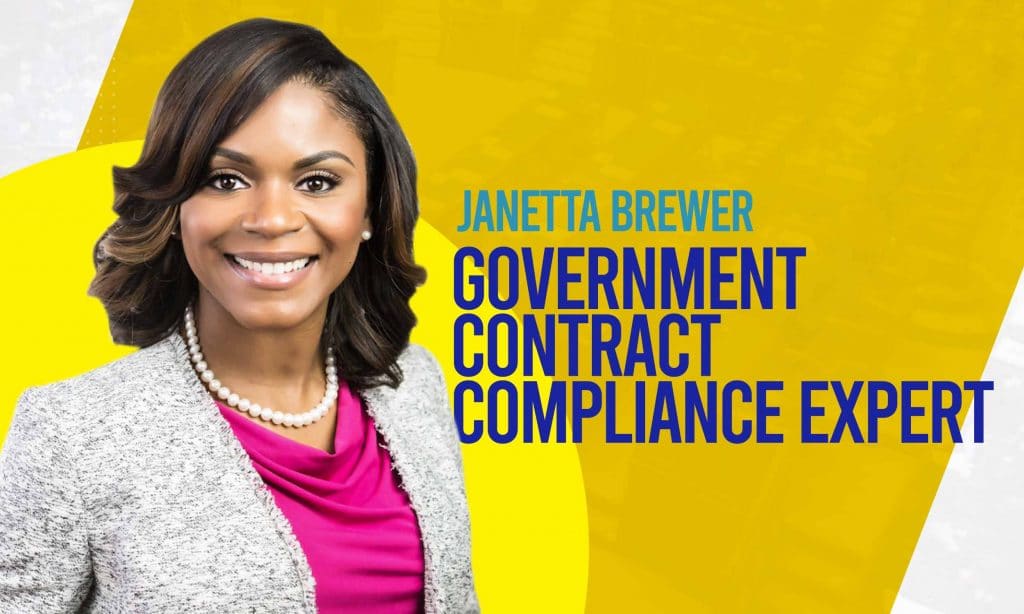An experienced government contract compliance expert, Janetta Brewer shares important information on the rules followed by the federal government and how businesses should remain compliant to all of these rules.
BACKGROUND
Janetta Brewer, Esq. had worked in different roles in various government agencies including the US Navy, Defense Logistics Agency, US Army Corps of Engineers, US Air Force, Department of Homeland Security, and in the Department of Defense.
In her last federal appointment, she was a senior member of the Defense Procurement and Acquisition Policy staff wherein she developed acquisition regulations and guidance that helped streamline the process and improve contract execution outcomes.
Currently, she is the owner of her own consulting company, Blue Alchemy Consulting, where she helps both government and industry clients in providing innovative policy processes, IT systems, and workforce development solutions.
PROCESS OF CHANGING THE FAR OR DFARS
Primarily, the Federal Acquisition Regulation is the set of principles, rules, and regulations that govern the federal procurement process.
However, consider that if you are working with other agencies such as the Department of Defense, NASA, or the GSA, these agencies have their own rules to supplement the FAR.
Then, when the 809 panel or the people appointed by the Congress to streamline the acquisition process recommend changes in the regulations, there’s a process to follow before changes are made.
At the FAR staff level or the DARS staff level, whenever there’s a recommended change to a regulation, these people have to review and assess that proposed change first to determine its impact to the industry and to small businesses and to what extent. This is a requirement.
The government will then issue a proposed rule highlighting all of their assessment and its impact to various small businesses and industries.
In most cases, this is where the industry groups come in place and put their inputs on whether they agree or disagree to the proposed ruling together with their reasons. The government heavily relies upon the input that was received from industry groups in this process.
Afterwards, the government will then create a final rule highlighting all of the changes through their assessment of the industry recommendations.
So, the final rules go into the maximum extent possible as the government tries to reduce the cost and impact on the industry while maintaining the regulatory requirement in place.
“We can not do something the Congress has mandated. We can only throw our implementation, try to do it in a way that reduces the impact of contractors.”
ADVICE FOR SMALL BUSINESSES
In dealing with the government, you need to be compliant with the rules that are put in place.
Don’t just focus on building better products and winning new contracts, you also need to build a compliant operational framework. This way, when the government does an audit, there will be no errors found.
“One of the ways that you invest in a company is exposing them to better ways to build a compliance framework so to speak. I would say that’s one of the areas that’s typically neglected as just companies in general.”
Also, you need to use the solicitation to your advantage. Consider that when there’s a dispute or changes in the instructions that are not written in the solicitation, you have both the ability to highlight that it is a change in the overall contract and ask for some type of remedy towards those changes.
“The more knowledge you have and the more you understand what your obligations and requirements are, but also not just what yours are but what the government’s obligations and responsibilities are to you, then you feel more comfortable and confident speaking.”
Lastly, you need to begin with the end in mind. If you aim to work with the federal government for the next five years, then you need to build the appropriate processes and framework that are in compliance with the rules and regulations.
“Because as you grow, obviously, sometimes you don’t necessarily have the time to invest in the backend stuff and it’s always easier if you have the framework in place to begin with and try to build it on the back end.”
RESOURCES
If you want to watch the full video of the interview with Janetta Brewer as she shares important information on the rules followed by the federal government and how businesses should remain compliant to all of these rules, then be sure to click the links down below.
016: Janetta Brewer ESQ – Government Contracts Compliance Expert
https://www.youtube.com/watch?v=fcAqs6jHAt0&list=PL6-jBNNcc98vTBvNhFYfUTeH0k-Vx2VBH&index=2
